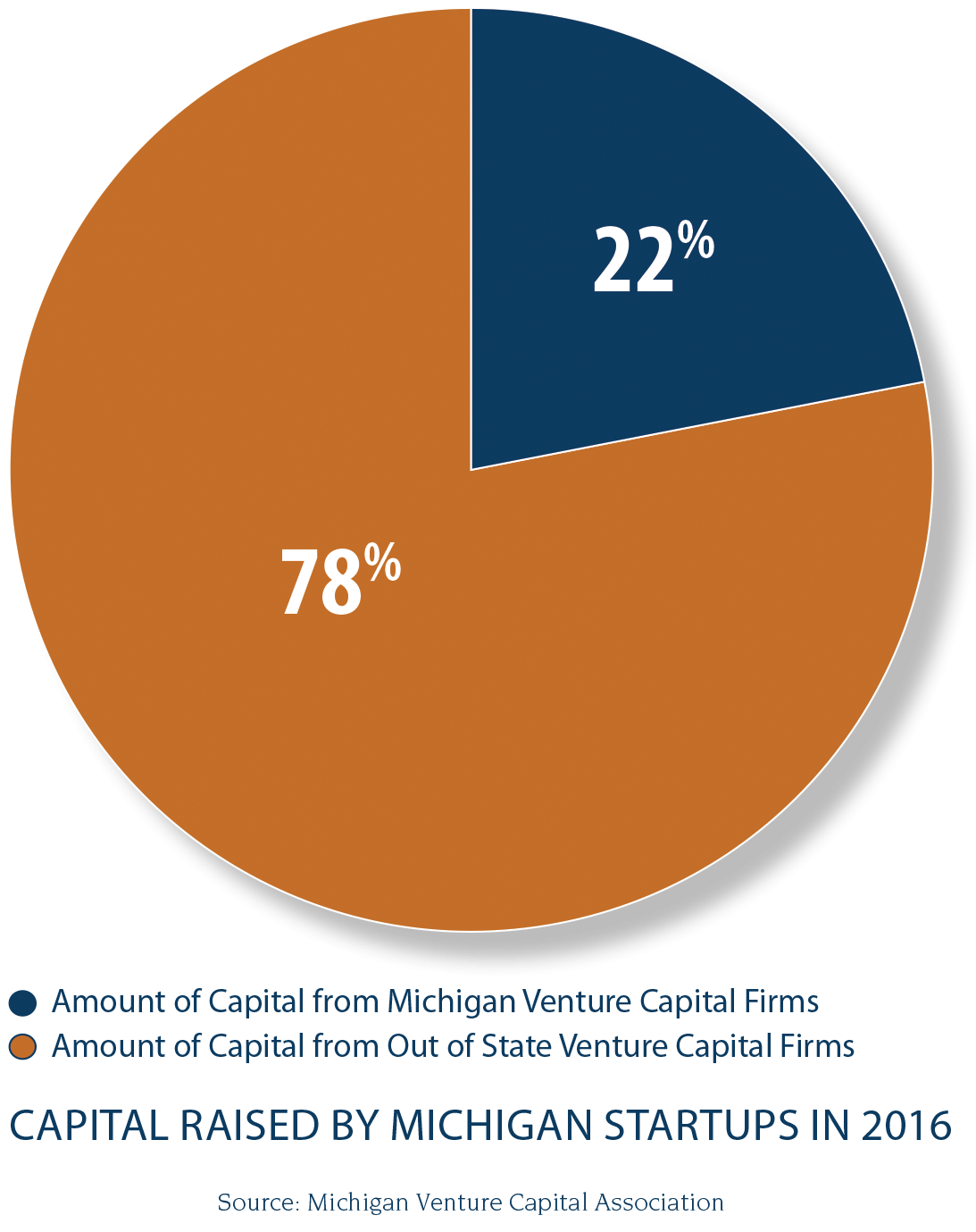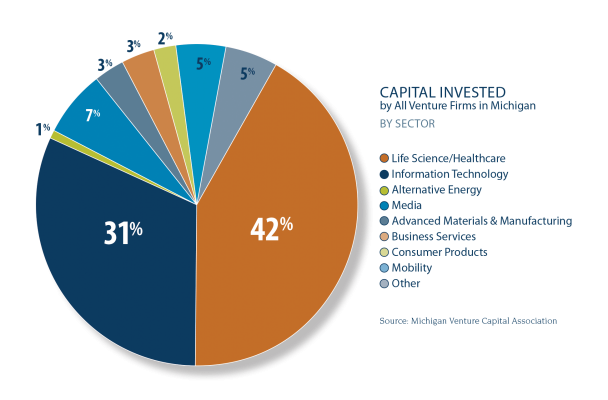This is the second post in our research report series! Read our first post about capital attraction here. The research series is based on findings from the 2017 MVCA Research Report. Like last year’s series, we are hearing the perspective of Michigan’s entrepreneurial and investment community. This week, we explore the topic of building a stronger entrepreneurial & investment community and have responses from Mahendra Ramsinghani (Secure Octane, “The Business of Venture Capital“, “Startup Boards“), Adrian Fortino (Mercury Fund), Senator Rebekah Warren (State of Michigan), Jennifer Owens (Lakeshore Advantage), Jeff Epstein (Ambassador)
I believe there are four basic elements that need to grow and work in unison to have a strong entrepreneurial community:
- Capital – We need to ensure there are experienced angel and venture capital investors with capital available to invest in and partner with companies as they grow.
- Community – We need to create meaningful, effective connections between every element of the community and strong entrepreneurial support organizations.
- Talent – We need experienced, competitive entrepreneurs and investors willing to take risks.
- Research – We need amazing research institutions and innovation corridors spinning out cutting edge ideas and technologies.
Over the last 10 years, significant work has been done to build these four elements in Michigan. However, now that Michigan is experiencing an economic upswing, we are becoming complacent in our efforts to foster growth in the entrepreneurial community, preferring instead to focus on sectors and stages with which we are comfortable and have traditionally been Michigan’s economic strengths. While Michigan’s entrepreneurial and investment community has seen a lot of growth over the course of the past decade, this segment of the economy is still fragile.
At MVCA, the trade association for the venture capital and angel community, we focus quite a bit on the “capital” and “community” elements and I do a lot of research on these two elements so that’s where I’m focusing my opinions. However, the other two elements are equally important. 
Currently, there is less capital available than is needed for Michigan companies across the pre-seed, seed, and growth stages. This hinders the growth of new companies in the state and creates circumstances in which terms and vetting practices are very conservative. The lack of access to capital also produces a situation in which Michigan isn’t building our pool of experienced investors. Moreover, given these conditions, startups are spending valuable time and resources raising the majority of their capital from non-Michigan sources and, in some cases, are even relocating to other states.
 Looking forward, establishing a foundation of companies in a variety of sectors and across all stages of development is critical to maintaining a stable economy. Michigan failed to nurture a diversified economy beyond the automotive industry for many years, and as a result, the state struggled greatly when that industry struggled. To remedy this error, Michigan wanted “new ideas” and set a course to develop a strong base of businesses across multiple sectors and stages of growth. Thus, the entrepreneurial and investment community in the state grew at nearly three times the rate of the national average. Unfortunately, despite ten years of strong and consistent progress, people are no longer committed to this path, and Michigan is now being surpassed by many neighboring states who are strengthening their own economies using programs based on Michigan’s past initiatives!
Looking forward, establishing a foundation of companies in a variety of sectors and across all stages of development is critical to maintaining a stable economy. Michigan failed to nurture a diversified economy beyond the automotive industry for many years, and as a result, the state struggled greatly when that industry struggled. To remedy this error, Michigan wanted “new ideas” and set a course to develop a strong base of businesses across multiple sectors and stages of growth. Thus, the entrepreneurial and investment community in the state grew at nearly three times the rate of the national average. Unfortunately, despite ten years of strong and consistent progress, people are no longer committed to this path, and Michigan is now being surpassed by many neighboring states who are strengthening their own economies using programs based on Michigan’s past initiatives!
The lack of access to capital for entrepreneurs in Michigan is a serious detriment to our ability to build and maintain a strong economy in the state. For the last two years, research has highlighted widening gaps in capital availability, as well as unprecedented decreases in key talent and capital trends that had been increasing for years. You may not see it now, but check the history books – failure to diversify the economy in Michigan will have a serious impact on the state’s ability to establish long-term economic stability that can weather economic downturns. We need to improve access to capital within the state to encourage the growth of an entrepreneurial economy.
The question I have for the entrepreneurial and investment community:
In addition to hard work by Michigan’s entrepreneurial and investment community, what can Michigan do to build a stronger entrepreneurial and investment community?
Responses:
 Adrian Fortino, Partner, Mercury Fund
Adrian Fortino, Partner, Mercury Fund
To fuel more pre-seed & seed funding, Michigan needs to increase the sophistication and funding capacity of its angel networks by educating angel investors on how to work best with pre-seed companies and ensure growth after the angel investments. Improved tax credit programs would help take Michigan’s pre-seed stages to the next level. Early stage funding must be localized and can be bolstered by state funding into current and new funds and angel groups. The growth stage funding partners don’t always have to be local, but absolutely need a local, credible conduit like the Series A Funds, Fund of Funds and the MVCA.
Talent is an area where resources are needed in Michigan. Though many states have tried to solve the talent-related issues, only the entrepreneurial community can successfully tackle the issue. The State needs to put resources in the hands of the entrepreneurs and allow them to utilize the resources as they see fit. Top talent won’t migrate to Michigan for a generic recruitment efforts directly from the State, but will for targeted opportunities in a pool of venture-backed companies supported by a government recruitment program.
Our focus should be on building companies that stay in the state and have $500M+ exits. As I’ve discussed here, those larger exits are the key to building organic sustainability in both early stage funding and talent.

Mahendra Ramsinghani – Founder, Secure Octane and Author, The Business of Venture Capital, Startup Boards
Today, Michigan entrepreneurs attract 3X more capital than a decade ago. We have a larger pool of capital and fund-of-funds like Renaissance Venture Fund to help the growth of venture funds. But on a national scale, Michigan is still well below 1% of the total venture capital invested. As you peer beneath the surface, some of the fundamental challenges still remain – access to seed and early stage funding is the hardest leap any founder can make. Michigan needs to seed a lot of companies so that our economic foundation continues to become stronger. At the next stage, growth capital is essential. Companies like Duo Security have attracted capital from leading Silicon Valley investors like Benchmark, Google Ventures and Redpoint.
Over ten years ago, I was a part of small team at MEDC that helped shape the building blocks of the entrepreneurial and investment community. The Michigan Venture Capital Association had just started about five years earlier, primarily to advocate for capital for high-tech entrepreneurs, and we worked in conjunction to develop a number of programs. It was a ‘full stack” approach to building angel networks, venture funds and fund-of-funds. Grand Angels was just getting started, with a miniscule $25k grant from the MEDC. The Michigan Life Sciences Corridor invested $1.5m in Arboretum Ventures Fund I (which was a <$20M fund back then). Eventually, the Fund-of-Funds program launched, which deployed $200M in venture funds. The legislation was initiated under the Engler administration but got completed when Granholm was the Governor. Both parties saw the importance of consistent, unwavering commitment to building the entrepreneurial community in Michigan.
In this day and age, having a three-pronged strategy over a consistent timeline could benefit Michigan entrepreneurs:
- Programmatic: Seeding bold startup ideas
- Financial: Ensuring supply of capital (across various stages)
- Cultural: Celebrating entrepreneurship and the drive of the entrepreneurial spirit
The State could maintain an economic interest and hold high standards of financial performance. Entities like Temasek Holdings (Singapore) or Mubadala Development Company (Abu Dhabi) have used capital as a way to drive betterment of society while generating strong financial returns.
Besides the State, I also believe that other major stakeholders could be encouraged by the state to take more responsibility in building and stabilizing our economy. In the recent times, General Motors (GM) invested $500 million in ridesharing company Lyft and acquired a startup, Cruise Automation for $1 billion. The Chevy Bolt is a formidable competitor to Tesla. And GM Ventures has a well stated investment strategy. Emerging from its 2008 bankruptcy and making such bold leaps is a testimonial to a Michigan company’s resilience. Can companies like GM participate more aggressively to help build the Michigan entrepreneurial ecosystem? If we strengthen the entrepreneurial spirit, we strengthen our future.
If we don’t do it, who will?
If not now, when?
 Senator Rebekah Warren, State Senator, State of Michigan
Senator Rebekah Warren, State Senator, State of Michigan
I am proud to work and live in Michigan, as it is one of the fastest growing venture capital investment areas in the nation. With 141 venture-backed companies in Michigan, venture capital and angel investors are funding our most innovative entrepreneurs and working closely with them to transform breakthrough ideas into new companies and industries that drive our state’s job creation and economic growth. Additionally, the work of the Michigan Venture Capital Association has been instrumental in building a strong, diverse, and vibrant entrepreneurial and investment community in Michigan, which is why I proudly introduced Senate Resolution 162 last year and Senate Resolution 32 this year to recognize the third week in April as Michigan Venture Capital and Angel Investment Week.
With that said, it is up to the State to continue the growth in demand for funding so that more firms will locate, invest, and receive help here in the state of Michigan. The State must be a partner to the entrepreneurial and investment community in every stage, especially the beginning, so that the pattern of money coming into Michigan from outside institutions through venture capital firms continues. In fact, more than 70 percent of the money venture capital firms manage in Michigan comes from outside institutions. It is up to the State to create a welcoming environment for startups and venture capital firms. I believe the State can work to create entrepreneurial services and opportunities statewide to build a stronger community at these earliest stages by investing in venture capital firms.
 Jennifer Owens, CEO, Lakeshore Advantage
Jennifer Owens, CEO, Lakeshore Advantage
The continued economic success of our state hinges on building a stronger entrepreneurial and investment community. In this time of economic prosperity, it is easy to rest on our laurels and focus solely on supporting established companies.
Investing in an entrepreneurial community is not only about creating new companies, but equally important attracting and retaining talent. According to The Millennial Economy, 62 percent of millennials have considered starting their own businesses, and 72 percent think startups are “essential for new innovation and jobs”. The next generation of leaders are more entrepreneurial than any generation before. Embracing that trend, investing in our entrepreneurial eco-system now will make significant impact for many years to come.
Michigan must continue to invest in entrepreneurial support and capital growth programs to remain economically strong today and tomorrow.
 Jeff Epstein, CEO, Ambassador
Jeff Epstein, CEO, Ambassador
To build successful and sustainable businesses in Michigan, it’s imperative to have a thriving tech community. However, before discussing ways to grow and expand a community, it’s important to understand how it should function.
To me, a community must be diverse, inclusive, valuable, inspiring, and selfless to be successful. By fostering this kind of community, it promotes greater synergy and productivity, making individuals more effective when they come together.
The strongest communities tend to be built from the ground up, often referred to as “grassroots” organizations or groups. Grassroots movements must be natural and organic, and they can’t be forced. In this way, the community here needs to be led by entrepreneurs to foster organic engagement and growth. Right now, it seems there’s a variety of events, organizations or content that, in general, doesn’t generate value and instead creates noise. In order to build a stronger entrepreneurial community in Michigan, we as a state need to focus our conversations, meetups, and events to engage experienced and valuable people in our community, which would then have a “network effect” on the entire community – experienced and engaged community members making connections with each other and in turn generating more experienced and valuable talent to Michigan.
Additionally, being an entrepreneur, the biggest incentive I see would be removing the exclusivity surrounding our entrepreneurial and investment community. Exclusivity leads to a more fragmented community run by a select number of organizations, which makes the community based more on who you know rather than merit. To build a strong community that lasts in the long term, Michigan needs to expand our networks beyond these local affiliations, so we can welcome and attract a larger talent pool and promote and support our greatest companies.
